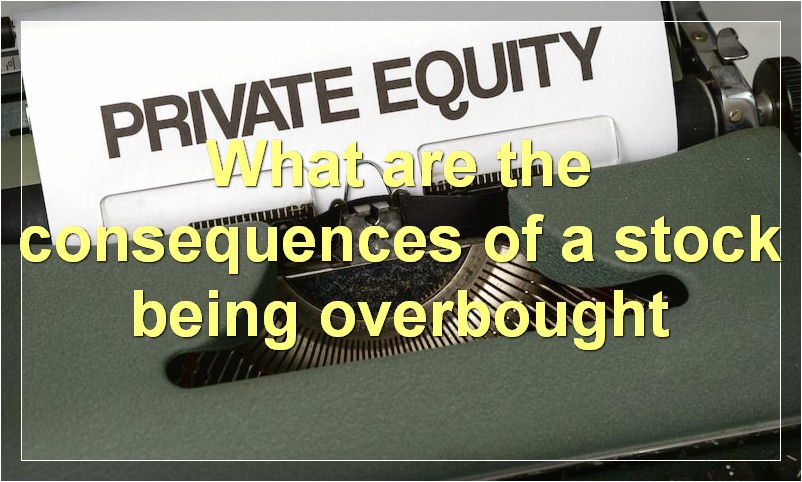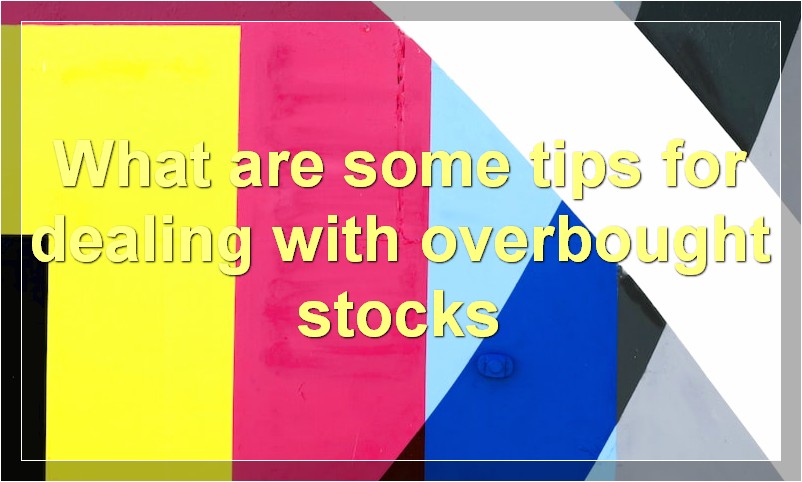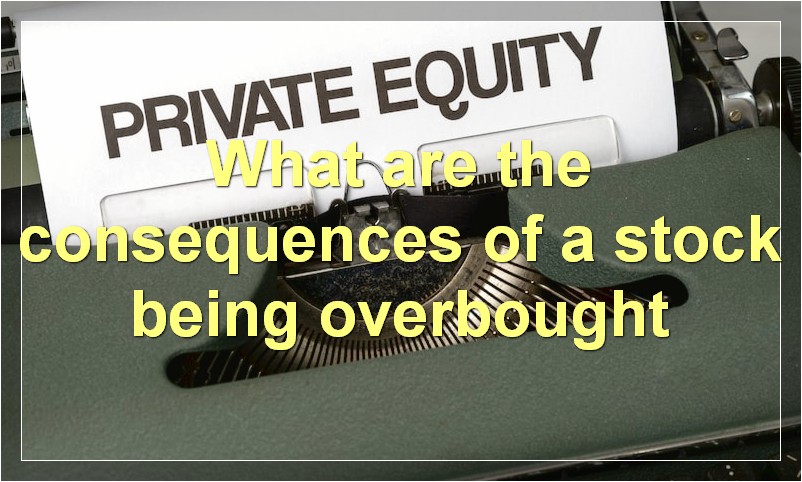If you’re thinking of investing in stocks, it’s important to know when they’re overbought. This guide will help you spot an overbought stock, so you can make the best decision for your investment.
What does it mean when a stock is overbought
When a stock is overbought, it means that the stock price is high relative to recent prices. This can be due to a number of factors, such as investors’ expectations of future earnings, or simply a lack of available shares. Overbought stocks are often considered ripe for a sell-off, as they may be due for a price correction.
What are the consequences of a stock being overbought

A stock is considered overbought when it becomes too expensive and there are few buyers left willing to pay the high price. This can lead to a sharp decline in the stock’s price when sellers finally outnumber buyers.
An overbought stock is often a sign that investors are becoming too optimistic about the company’s prospects and that a corrections or pullback may be due. If the stock price continues to rise despite deteriorating fundamentals, it could be a warning sign of a bubble.
When a stock is overbought, it may be a good time to take profits or at least reduce your position. However, timing the market is difficult, so it’s important to do your own research before making any decisions.
How can you tell if a stock is overbought
When analyzing a stock, there are a few indicators you can use to tell if it is overbought. One way to tell is by looking at the price relative to the moving average. If the stock price is consistently trading above the moving average, it could be an indication that the stock is overbought. Another indicator you can look at is the Relative Strength Index (RSI). The RSI measures the momentum of a stock and if it is consistently above 70, it could be an indication that the stock is overbought. Finally, you can look at volume. If there is a sudden increase in volume and the stock price starts to go up, it could be an indication that the stock is being bought up quickly and could be overbought.
Is there a way to avoid overbought stocks
The answer to this question is not as simple as a yes or no. While there are a few strategies that investors can use to avoid overbought stocks, it is ultimately up to the individual to decide what is best for their portfolio. Some things to consider when trying to avoid overbought stocks include paying attention to price momentum, using technical analysis, and being aware of market conditions.
What is the definition of an overbought stock
An overbought stock is a stock that has been bought by too many investors and is now overvalued. This can happen for a number of reasons, but it usually happens when there is a lot of positive news about the company or the stock market in general. Overbought stocks are often considered to be at risk of a correction or even a crash, so they are not typically considered to be good investments.
What are some tips for dealing with overbought stocks

When a stock becomes overbought, it means that it has been bought by too many investors and is now overvalued. This can lead to a stock price crash, so it’s important to be careful when dealing with overbought stocks.
Here are some tips for dealing with overbought stocks:
1. Don’t blindly follow the crowd. Just because a stock is popular doesn’t mean it’s a good investment. Do your own research before buying any stock.
2. Be patient. Overbought stocks can sometimes correct themselves before crashing. If you’re not in a hurry to sell, you may be able to wait out the overbought phase and sell later for a profit.
3. Use stop-loss orders. A stop-loss order is an order to sell a security at a certain price. This can help limit your losses if a stock price starts to fall.
4. Be prepared to sell. If you do decide to sell an overbought stock, have an exit strategy in mind. Know how much you’re willing to lose and set a price at which you’ll sell.
5. Stay diversified. Don’t put all your eggs in one basket. Overbought stocks are often more volatile than the overall market, so it’s important to diversify your portfolio to limit your risk.
How do investors react to overbought stocks
When a stock is overbought, it means that it has been bought by too many investors and that demand for the stock is high. This usually happens when a company’s share price has risen sharply in a short period of time and is now considered to be overvalued. Overbought stocks are often seen as a risky investment and investors may start to sell their shares, which can cause the stock price to fall.
What are the risks of investing in overbought stocks
There are a few risks to keep in mind when investing in overbought stocks. First, the stock may have already reached its peak and could start to decline soon. Second, there could be a lot of competition to buy the stock, driving up the price and making it more difficult to turn a profit. Finally, overbought stocks are often associated with poor fundamentals and high levels of debt, which could make them more risky investments.
Are overbought stocks always a bad investment
There is no simple answer to this question. While it is true that overbought stocks may be a bad investment, there are also many factors to consider before making any decisions. Overbought stocks may be more likely to experience a sudden drop in price, but they may also be on the verge of a breakout. Many factors, such as market conditions and company fundamentals, must be considered before making any investment decisions.
What are some strategies for dealing with overbought stocks
When a stock becomes overbought, it means that it has been bought by too many investors and is now overvalued. This can lead to a stock market bubble, where prices continue to rise even though the underlying value of the company has not changed. This can eventually lead to a stock market crash, where prices fall sharply.
There are a few strategies that investors can use to deal with overbought stocks. One is to wait for a pullback, where prices fall back down to more realistic levels. Another is to short the stock, betting that the price will fall. Finally, some investors may choose to buy puts, which give them the right to sell the stock at a certain price.

